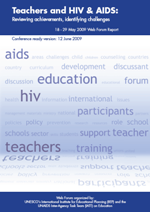IATT on Education E-Forum Report on Teachers and HIV & AIDS
Del 16-06-2009 al 18-06-2009 (Ireland)

UNESCO’s International Institute for Educational Planning (IIEP) and the UNAIDS Inter-Agency Task Team (IATT) on Education organized an e-Forum on “Teachers and HIV & AIDS: Reviewing achievements, identifying challenges” from 18 to 29 May 2009.
The Forum aimed to promote the exchange of views and experiences on the contribution of teachers to HIV prevention and mitigation efforts and the impact of the epidemic on teachers.
The outcomes of the Forum directly fed into the Spring meeting of the UNAIDS IATT on Education, hosted by Irish Aid in Limerick, Ireland in June 2009, which had ‘Teachers and HIV & AIDS: Reviewing achievements, identifying challenges’ as its Symposium theme.
To download a copy of the report on the outcomes of the discussion , please click here.
Contributions to the forum may be viewed online at: http://forum.hivaidsclearinghouse.unesco.org
For more information on the IATT Symposium in Ireland, please visit: IATT on Education.
Forum Theme and Sub-Topics for Discussion
Teachers are instrumental to the achievement of the Education for All (EFA) goals, and also have a critical role to play in school-based HIV prevention efforts. However, evidence of effective teacher involvement in the HIV and AIDS response is scattered and the lessons learnt, as well as their implications, are yet to be comprehensively fed back into joint efforts around EFA.
This makes it opportune and important to review what progress has been made in involving teachers in the HIV response and to consider how this can inform the efforts to achieve EFA and the Millennium Development Goal to ‘halt and reverse the spread of HIV’ by 2015.
We know today that children and young people who go to school have better opportunities in life and better protection against disease, including against HIV. This protective benefit of education is particularly important for girls. Yet many children do not have access to education, due to the teacher shortages among other causes. And even where teachers are in schools, issues of capacity play an enormous role in the overall quality of the education provided, and in whether and how these teachers will address HIV and AIDS.
In many countries, curricula now include HIV- and AIDS-related content, often as part of a broader focus on life skills and healthy living. Teachers are given an important responsibility in ensuring that children and young people acquire essential knowledge, skills and attitudes for prevention. In higher prevalence settings, teachers are seen as pivotal in ensuring that pupils affected and infected as a result of the epidemic have access to care and support.
Without teachers the endeavour of providing EFA cannot be achieved. However, teachers face challenges in playing the role that is attributed to them. These challenges include the often difficult working environments (i.e. overcrowded classrooms, lack of materials) and poor or inexistent training. In many contexts – in particular in sub-Saharan Africa – teachers are themselves affected by HIV and AIDS. Stigma and discrimination, gender inequity, concerns around morality, cultural issues and relationships between teachers and students often make the actual environment in which school-based HIV and AIDS education is highly complex.
The Forum invited discussion on four interrelated sub-topics:
1. Involving teachers in HIV prevention – policy and management implications
2. Coverage and content of pre- and in- service training for teachers
3. The role of teachers in child protection and promotion of safe and healthy school environments
4. Supportive and enabling environments for teachers affected by HIV and AIDS
All four sub-topics were accessible over the course of the E-Forum.
The Forum was animated by e-moderators (IIEP and UNAIDS IATT Secretariat staff), with daily syntheses of Forum discussions and commentary to guide further discussion on the sub-themes.
To download a copy of the conference report, please click here.
Related links
HIV and AIDS Clearinghouse
- Organizador: UNAIDS IATT
- Fecha de inicio - Hora local: 16-06-2009 10:00 am
- Fecha de clausura - Hora local: 18-06-2009 10:00 am
- Limerick, Ireland
Limerick
Ireland


